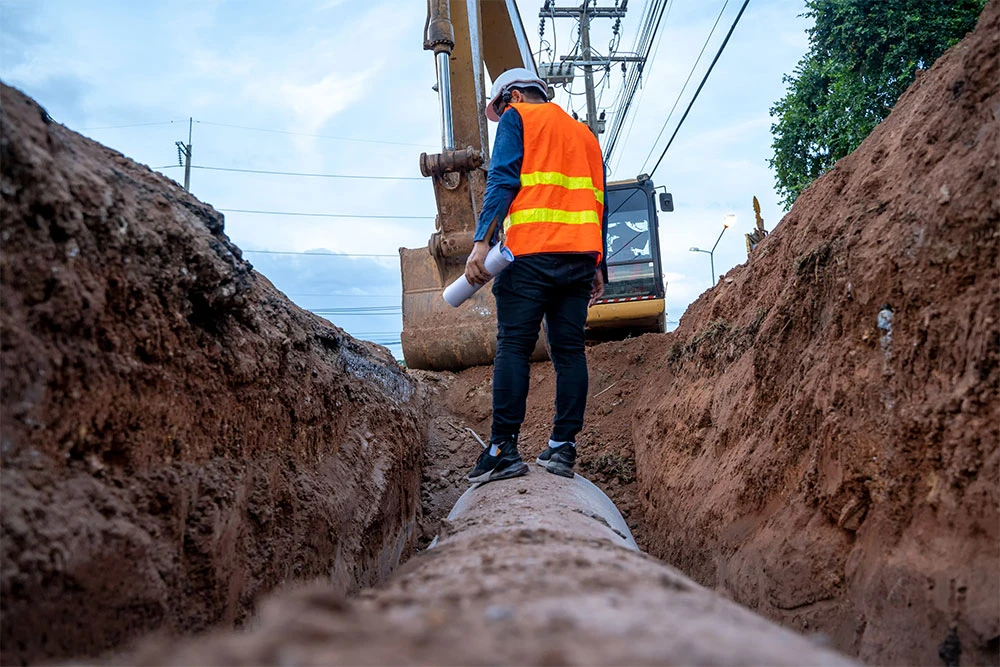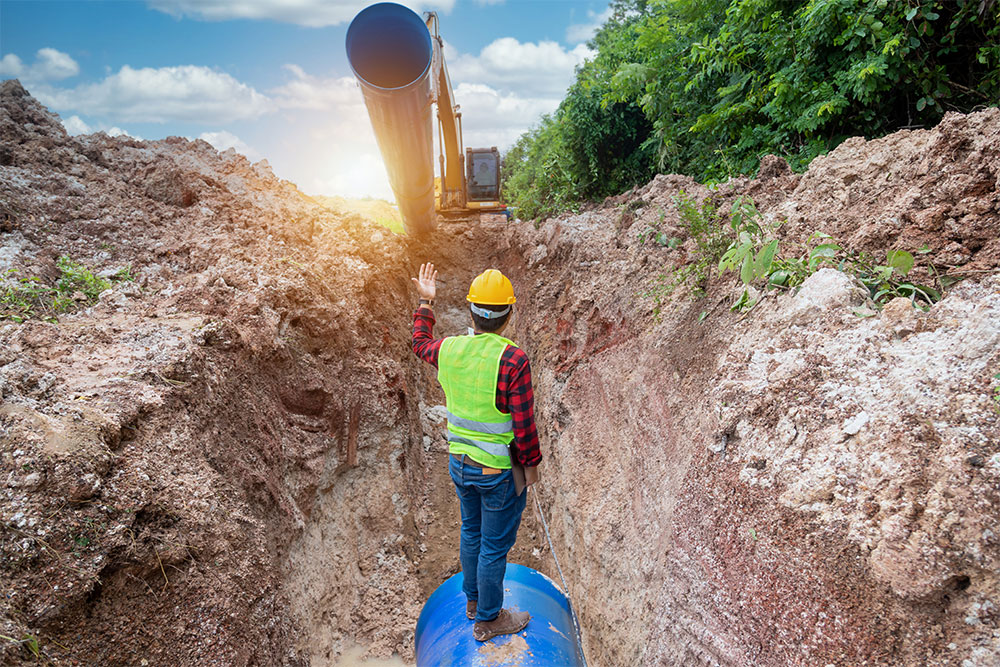Understanding the Vital Role of Drainage Engineers in Building Sustainable Communities
Navigating the intersections of civil engineering, sustainability, and community resilience, drainage engineering is a field of critical importance that often remains overlooked.
Understanding Urban Impacts
Urbanization brings about significant changes to landscapes, introducing impervious surfaces that disrupt natural water cycles and ecosystems. This transformation leads to increased runoff and flooding risks, highlighting the critical need for effective drainage solutions.
Drainage engineers play a pivotal role in mitigating these risks by designing and implementing robust drainage systems. Their expertise ensures that urban developments are resilient to water-related disasters while minimizing adverse impacts on the environment.
As our populations increase and our climate changes, higher populations of people are also migrating towards accessible water sources which can cause geopolitical tensions to rise. An Example of this is in the Colorado river basin, where we have seven states contesting the allocation of the water in this river.
Read more here: https://www.latimes.com/california/story/2023-02-07/comparing-two-competing-proposals-for-colorado-river-cuts
Drainage Engineering: A step towards a healthy future.

Drainage engineering tackles the challenges posed by urbanization, (which often leads to increased pollution and altered water flow patterns impacting environmental elements and species). It focuses on managing water in urban areas to prevent the destruction of natural habitats and waterways and the sustainable management of water resources.
This involves designing sustainable drainage systems that capture, convey, and treat stormwater runoff, reducing pollution levels, minimizing flooding risks, and maintaining ecological balance within urban landscapes.
By integrating green infrastructure, stormwater management techniques, and water quality improvement measures, drainage engineering aims to harmonize urban development with environmental conservation, promoting sustainable practices that benefit both human communities and natural ecosystems.
Drainage Engineering: The industry
Drainage engineering is a specialized branch of civil engineering focused on managing surface water runoff to prevent flooding, erosion, and water contamination.
It encompasses the design, construction, and maintenance of drainage systems, including stormwater drains, culverts, retention ponds, and green infrastructure.
Drainage engineers utilize principles of hydrology, hydraulics, geotechnical engineering, and environmental science to develop sustainable solutions that balance the needs of communities with the preservation of natural ecosystems.
While a plumber or technician will focus on the implementation of designs, it is up to a drainage engineer to keep the entire network in mind and apply their skills to create sustainable infrastructure.
Drainage Engineer Services:
Site Surveys:
A Drainage engineer conducts comprehensive site surveys to assess topography, soil composition, and existing drainage infrastructure, providing essential data to ensure water quality to surrounding areas remains uncompromised.
One of the most cutting edge methods of preserving our most precious natural resource is recharging aquifers. This method has, however, shown mixed results across various projects. You can read more about the recharging of aquifers in california here.
Hydrological Analysis:
Utilizing advanced modeling techniques, and hydro-science, a drainage engineer analyzes rainfall patterns, surface runoff, and water flow dynamics to determine the most suitable drainage for any portion of land.
Design and Planning:
a Drainage engineer develops detailed drainage plans tailored to the specific needs and challenges of each project, incorporating elements such as stormwater management systems, retention ponds, and erosion control measures.
Permitting Assistance:
Drainage engineers assist clients in obtaining necessary permits and approvals from regulatory agencies, ensuring compliance with local, state, and federal regulations governing drainage projects.
Construction Oversight:
Drainage engineers oversee all aspects of construction, from site preparation and excavation to installation of drainage infrastructure, ensuring that projects are completed safely, efficiently, and according to design specifications.
Quality Control and Assurance:
Drainage engineers conduct rigorous quality control inspections to verify the integrity and functionality of civil engineering systems, identifying and addressing any deficiencies or deviations from the design.
Maintenance and Rehabilitation:
Drainage engineers develop comprehensive plans to ensure the long-term performance and reliability of drainage infrastructure, conducting regular inspections, repairs, and rehabilitation efforts as needed.
Risk Assessment and Mitigation:
Drainage engineers assess the risk of flooding, erosion, and other water-related hazards, developing strategies to mitigate these risks and enhance the resilience of communities and infrastructure.
Green Infrastructure Design:
Drainage engineers incorporate green infrastructure elements such as rain gardens, bioswales, and permeable pavements into drainage designs to enhance water quality, biodiversity, and urban resilience.
Emergency Response Planning:
Drainage engineers develop emergency response plans to help communities prepare for and respond to natural disasters and extreme weather events, minimizing the impact of flooding and other water-related emergencies.
By offering a comprehensive range of services, drainage engineers play a crucial role in safeguarding communities and protecting water resources. They use specialist skills to promote sustainable development in an increasingly complex and interconnected world
Drainage Engineer and Their Role on Projects:

When it comes to managing water flow and drainage, drainage engineers are qualified specialists in designing and surveying drainage systems. Their qualification means they have the necessary skills that allow our use of water to have a positive or at least neutral effect on our natural environment.
Drainage engineers use their skills to carry out a wide range of tasks:
- Complete Engineering Tasks: Drainage engineers handle a variety of engineering tasks on job sites, including drainage, roads, pipeline, and general civil design. This involves assessing site conditions, and ensuring compliance with regulations.
- Assess project requirements: Drainage engineers can assist in developing a thorough project brief that ensures companies, private individuals and governments clearly understand their drainage requirements.
- Design of Drainage Systems: Drainage engineers design both open and closed systems tailored to the specific needs of each project. This includes stormwater management facilities, retention ponds, and temporary drainage structures.
- Utilization of (SUDs): Drainage engineers are experienced in incorporating sustainable features such as balancing/infiltration ponds, soakaways, and attenuation tank systems into their designs to manage surface water runoff effectively.
- Software Proficiency: Drainage engineers are proficient in using design software such as AutoCAD and Micro-drainage to create detailed plans, profiles, and sections for drainage infrastructure.
- Preparation of Consent Applications: Drainage engineers assist in preparing consent applications and liaising with water or drainage authorities to obtain design approval for drainage projects.
- Compliance Management: Drainage engineers ensure compliance with quality, safety, and environmental procedures throughout the project lifecycle.
- Engineering Calculations and Reports: Drainage engineers assist in conducting engineering calculations, computer modeling, and preparing design reports, permitting documents, and contract quantities.
- Infrastructure Planning and Implementation: Drainage engineers are involved in the planning, design, and implementation of drainage and utilities infrastructure across a wide range of projects, including highways, civil works, and utilities.
- Expertise in Stormwater Management: Drainage engineers have expertise in stormwater management design, low impact design (LID), channel restoration, erosion protection, and scour protection, ensuring effective water management and minimizing flood risks.
- Client Interaction and Regulatory Compliance: Drainage engineers interact directly with clients, regulatory authorities, and other stakeholders to ensure project success and compliance with regulations and standards.
In summary, drainage engineers provide a comprehensive range of services aimed at managing water flow, preventing flooding, and ensuring the integrity and sustainability of drainage infrastructure on construction sites. Their expertise and experience are essential for successful project outcomes and environmental stewardship.
Types of Projects:
A drainage engineer is involved in a wide range of projects, from small-scale residential developments to large-scale infrastructure initiatives.
They work closely with architects, urban planners, and environmental scientists to integrate drainage seamlessly into the built environment, ensuring that water resources are managed efficiently and sustainably.
Some common projects include designing stormwater management plans for new subdivisions, retrofitting existing infrastructure to improve water quality, and implementing green infrastructure to mitigate urban heat island effects and enhance biodiversity.
Drainage Engineering: A Career Overview
Professionals find themselves at the forefront of shaping resilient communities and sustainable infrastructure. Employers across various sectors, including government agencies, engineering firms, and construction companies, actively seek skilled drainage engineers to join their teams.
Day-to-day tasks in this field typically involve designing, implementing, and managing drainage systems to mitigate flooding and ensure water quality.
Working for these employers, drainage engineers engage in a range of responsibilities. They analyze project requirements, conduct site surveys, and develop detailed drainage plans tailored to specific needs.
Additionally, they collaborate with surveyors, technicians, and construction teams to oversee the implementation of these plans, ensuring projects are completed efficiently and effectively.
Longevity and Inspections.
Moreover, drainage engineers play a crucial role in ongoing maintenance and inspection of drainage systems, identifying and addressing issues to uphold performance standards.
This multifaceted role demands a blend of technical expertise, problem-solving skills, and a commitment to environmental stewardship.
Overall, a career in drainage engineering offers the opportunity to work with diverse employers, engage in meaningful tasks, and contribute to the development of resilient communities through effective water management.
Conclusion:
In conclusion, a drainage engineer is a vital component of sustainable development, ensuring that communities are resilient to the challenges posed by climate change, urbanization, and aging infrastructure.
There is after all no need for humans to have a negative impact on the environment. With the tools currently available and the skills of qualified drainage engineers we can greatly reduce our impact on natural resources.
By effectively managing surface water runoff, drainage engineers help mitigate the risk of flooding, protect water quality, and promote environmental sustainability.
As we continue to confront these challenges, the expertise of drainage engineers will be increasingly indispensable in building resilient communities that can thrive in the face of environmental uncertainty.
Let’s recognize the crucial role of drainage engineers in shaping our world and support their efforts to create a more sustainable future for all.





